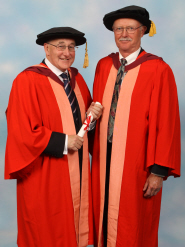He has played a key role in helping transform the performance of the NHS locally, regionally and nationally.
His hard work and commitment are being marked by the University of Bristol today when he will receive a Doctor of Laws honorary degree, given in recognition of outstanding achievement and distinction in a field or activity consonant with the University’s mission.
Sir Ian said: “I am delighted to be receiving this honorary degree from the University of Bristol today.
“The NHS is hugely valued and it has been a real privilege to work within it and seeing it improve and progress to constantly drive forward the quality of care it delivers as well as meet the changing needs of the people it serves.”
Professor Selby Knox, Emeritus Professor in the School of Chemistry, is delivering the oration at the ceremony and said: “Ian is also passionate about the value of education and its ability to transform lives.
“He has risen to the very top of the NHS through hard work, a commitment to learning, demanding the highest standards of himself and others, and by inspiring people to produce more than they believed they were capable of. By so doing he has improved healthcare for millions of his fellow citizens.”
But Sir Ian wasn’t always destined for a high-flying career in the health service. Instead, he had aspirations of becoming a professional footballer.
He excelled at sport and was offered a contract with Carlisle United but his father insisted he should focus on school work and get a proper job.
His first job was in the motors department of Royal Insurance but he soon decided that insurance wasn’t for him and joined his local hospital as a wages clerk in 1969, on the lowest administrative grade.
This is where his lifetime of service to the NHS began. Sir Ian worked to achieve an Open University degree in his spare time and progressed to management roles across the country.
Having impressed ministers with his ability to hit healthcare targets rapidly and within budget, he was invited to sort out Hampshire and the Isle of Wight, which were then projecting a huge annual deficit of £120 million pounds. He reduced this to £25 million within eight months.
The call to become Chief Executive of the South West Strategic Health Authority followed and then almost immediately to become Acting Chief Executive of the entire NHS when the then Chief Executive unexpectedly departed.
While he enjoyed the role, he decided to return to his post in the South West because he wanted to be closer to doctors and patients.
The South West Strategic Health Authority is now top of the NHS performance tables. It oversees a budget of approximately £8 billion, which is used to care for the 5.1 million people who live in the South West.
Professor Knox added: “Those who have worked with him say that he is passionate about patient care, he has an uncompromising, relentless approach to improving care for the individual patient.”
Sir Ian’s achievements have also led to him being awarded an OBE in 1997 and a knighthood in 2003.
